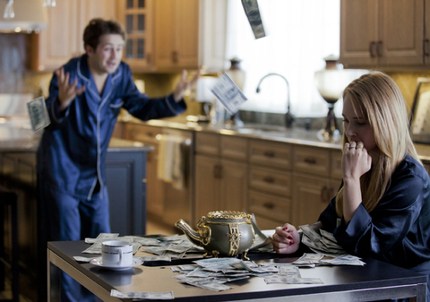Review: THE BRASS TEAPOT Somehow Succeeds in Spite of Itself

Alice (rising star, Juno Temple) and John (Michael Angarano, that kid from Sky High) are a cute, if callow, young couple caught in the cogs of the economic downturn.
His business degree has only landed him a telemarketer job and her art-history degree leaves her going to one failed job interview after another. Her Nicole Kidman To Die For wardrobe choices and perky attitude does not appear to help when the other interviewees have more qualifications or experience. They pay their credit cards with other credit cards, which would actually make living paycheque to paycheque kind of a step up.
Passive-aggressively poked by their more fiscally stable family, who just want the young couple to get on with it and have kids, and jealous of their wealthy trust-fund 'friends' from high school, who ignore them yet invite them to lavish parties for the purposes of showing off, somehow Alice and John are happy enough in their day-by-day existence until the eponymous mystical money brewing apparatus lands in their lap.
The Brass Teapot feels like something that Steven Spielberg would have produced in the mid to late 1980s. It mixes the overall story themes and narrative structure of Gremlins with the goofy morality play of The 'Burbs and the money sense of one of those Danny Boyle found-bag-of-cash films. It feels like a well produced feature-length Amazing Stories episode that riffs on J.R.R. Tolkien's precious One Ring and W.W. Jacob's The Monkey's Paw. It eschews any sort of weightiness to its stakes or consequences and is content to play out in a rather bubble-gum fashion, a fashion that is far too on the nose, at times, for its own good.
Nevertheless, its earnest celebration of the cluelessness of the American Middle Class -- a cynicism-free faith that eventually regular folk will do the right thing is endearing in its own way. Its thesis is something along the lines of: Money is the root of all evil and suffering. But it offers a first amendment to that truism, insofar as it is OK to have more than your fair share if you are a good American with a self-deprecating sense of humour.
It is the breeziest post-economic meltdown movie to come along since 2008, even if I include the tangentially-related The Other Guys by virtue of that film's wonderful closing titles. The Brass Teapot has a heart stuck in the blockbuster pop culture quagmire of the 1980s, but I wonder if the Gen-X aged movie-nerd crowd will embrace it with the same uncritical open-arms as Ernest Cline's bestseller, Ready Player One, or whether this film is the limit of how far a story can pander to its base.
One of the pleasures of the film is the couple discovering the 'rules' of the device, that, it should be noted, is designed and shot like a micro Ark of the Covenant (replete with a Star of David in gilded gold.) The teapot spontaneously fills itself with American greenbacks when pain is inflicted upon someone nearby. At first, minor self-immolations net crisp $100 bills, and the couple make it their full time job to hurt each other in small ways to get out of debt. Chaste, but naughty sex acts (confirming Juno Temple's penchant for off-kilter roles in even something such as this) may prevent a film like this from feeling like a modern Amblin Entertainment picture, but its heart is in the right place.
Eventually, minor acts of pain and bondage start to yield diminishing returns, and by this time, the couple are addicted to the free supply cash and bump in lifestyle. Stronger measures have to be taken. John, having seen enough of these types of films -- as seen in the parade of geek T-Shirts on his back -- offers to set a limit to get rid of it after netting enough money for a sizeable nest egg. His wife is not entirely convinced about that until other interested parties, Jewish and Asian stereotypes (cartoonish and perhaps reckless in 2012, but nice to see Steve Park from Fargo getting work) come sniffing around for the object.
Sporting a flutey, up-beat score and a gently accessible satirical bent, the film is never cynical, or inherently cruel, despite its premise, even as the pain payoffs transfer from physical to emotional pain. It wants to confirm the comforting Yankee self-image that they are the common-denominator good guys who can survive their own sense of self-entitlement and corrupting nature of power where hundreds of other cultures throughout history -- hobbits notwithstanding -- have failed.
As offensive (or cutesy) as that may be to some, The Brass Teapot is unabashed about wearing its heart (and its favourite pop myths) on its sleeve. First time director Ramaa Mosely and her writer Tim Macy are inviting enough with their tone here that I found myself choking back the gag reflex at some of the film's more egregious racial and cultural transgressions and pretended it was 1989 again. Judge me if you will.
(Review originally published in slightly different form during the Toronto International Film Festival in September 2012. The Brass Teapot is available starting today via various Video On Demand (VOD) platforms.)







